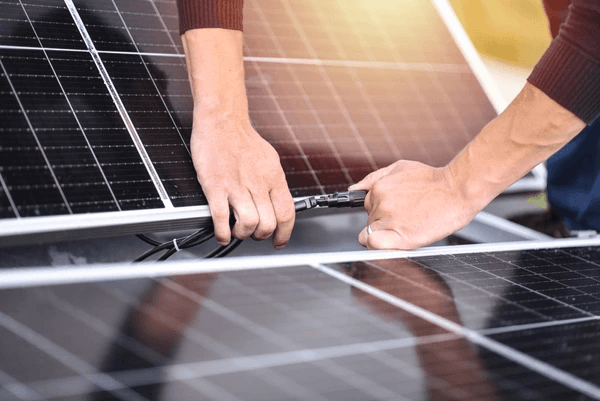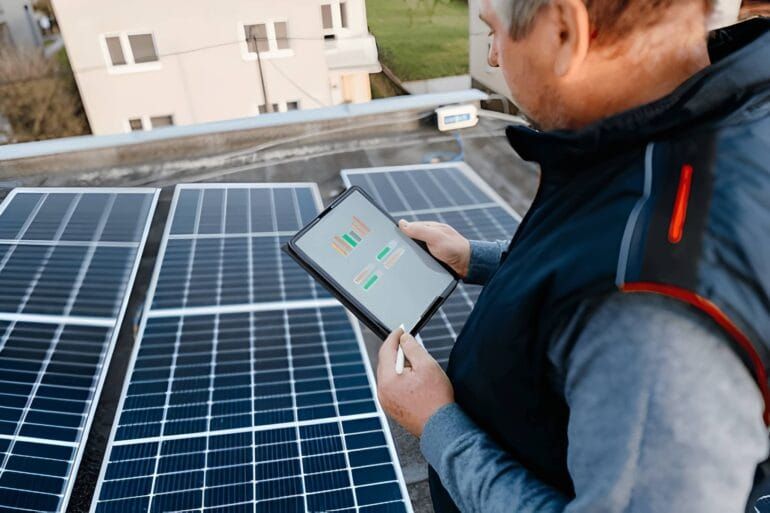As the world shifts toward renewable sources of energy, installing solar panels at home is becoming an increasingly popular and ecologically friendly choice. One of the critical components of a solar power system is the solar inverter, which plays a pivotal role in converting the DC (direct current) electricity produced by solar panels into AC (alternating current) electricity used by household appliances. In this comprehensive guide, we’ll explore the different types of solar inverters Perth, their functions, and how to choose the best solar inverter Perth for your home.
What is a Solar Inverter and Why Is It Important?
Before delving into the various solar inverters available in the market, it is important to understand what the primary function of a solar power system is. Solar inverters convert the DC electricity from the solar panels into usable AC electricity that is used by household appliances and devices. Without a reliable solar energy inverter, your solar system would not have a means to deliver usable power.
This will determine the general performance of your solar system. A high-quality solar panel inverter ensures that your solar power system operates at its peak efficiency, maximizes energy production, and minimizes electricity costs. Whether it’s for a home or business, choosing the right solar inverter is important for any solar panel installation in Perth.
Types of Solar Inverters
When choosing the right solar inverter, it is essential to know the different types that are available in the market. Each type has its advantages and is suited to specific installation conditions and requirements. Below is an outline of the three main types of solar inverters: central/string inverters, micro-inverters, and hybrid inverters.
1. Central/String Inverters
Central inverters, also referred to as string inverters, are the most common solar inverters used in residential and commercial solar power systems. These inverters manage the entire system and tend to be relatively large, about briefcase-sized. In this design, all the solar panels connect to the inverter in series or “strings,” and the inverter converts the DC electricity produced in your photovoltaics into AC electricity for use in your home.
Advantages:
- Cost-effective: Central inverters tend to be cheaper compared to micro-inverters.
- Easy installation: These inverters are easier and simpler to install and maintain since the system is more centralized.
Disadvantages:
- Less flexible: In case one panel in the string becomes damaged or fails to perform, the whole system may suffer.
- Failure likelihood: When the solar inverter Perth system fails, the whole system will stop operating. This might lead to downtime.
2. Micro-Inverters
Micro-inverters are smaller solar inverters, and one unit is attached to each individual solar panel. Micro-inverters do not tie panels together like central inverters do. This means that if one panel fails or is shaded, the rest of the system continues to function at optimum.
Advantages:
- Optimization per panel: There is optimization per panel to generate maximum energy. Shading or dirt on one panel will not affect the whole system.
- Enhanced reliability: If one inverter stops working, the rest of the panels are not impacted, hence it is far more reliable in areas of shade, or when dealing with complicated roof structures.
Drawbacks:
- Higher installation costs: Individual micro-inverters are typically more costly than a central inverter system since they require numerous units for a single panel.
- More complicated wiring: Installation and service will be more complicated since there will be more units to work with.
3. Hybrid Inverters
More advanced are hybrid inverters. They really put traditional solar inverter abilities together with the capacity for adding storage to the batteries. Inverters such as these allow you to store solar energy in the batteries for when they aren’t producing it, including nighttime or a blackout.
Benefits:
- Energy independence: A hybrid inverter with battery storage means you always have access to power through the sun.
- Flexibility: Hybrid systems are ideal for those who want to have an increased amount of energy independence or grid independence.
Disadvantages:
- Higher upfront cost: Although hybrid inverters offer more benefits, they come with a higher price tag compared to standard central or micro-inverters.
- More complex installation: Hybrid systems require more complex installations and often involve batteries and additional wiring.
Key considerations when choosing Solar inverters Perth
To choose the right solar inverter Perth, there are a number of factors involved. Here are some considerations to make when deciding on the right choice:
1. Roof Layout and Shading
If your roof is multi-sloped, faces in different directions, or has lots of shading, you may need a more sophisticated solar inverter such as micro-inverters or a multi-string inverter that has multiple maximum power point trackers, or MPPTs. These will maximize the utilization efficiency of each panel, even if they are not angled in the same direction or exposed to sunlight equally.
2. Capacity of Panels vs. Inverter
The selection of a solar inverter also requires consideration of the inverter size relative to total panel capacity. As a rule, it makes sense to choose an inverter that is somewhere between 20% and 30% smaller than the total panel capacity. For example, if your panels have 5 kW, you should choose a 4 kW Perth solar inverter.
Over-sizing your panels will give you the ability to create more energy, especially during summer, and is generally more economical because of the solar rebates.
3. Reliability and Warranty
It is one of the most critical parts of your solar system: the inverter. A good-quality inverter will let your system run efficiently for a long time. When you choose an inverter, reliability supersedes efficiency.
Such premium inverters from companies like Fronius, SMA, and SolarEdge are manufactured with long warranties of 10 to 12 years and are well known for their solid performance. The general standard warranty offered on solar inverters is five years, but a premium inverter will give one greater peace of mind and reduce downtime in the future.
4. Energy Efficiency
Another important factor in choosing a solar inverter Perth is the degree of efficiency. The efficiency of an inverter determines how much of the DC electricity generated by your panels is converted into usable AC power. More efficient inverters convert more energy, which can help minimize your electricity bill in the long run.
While the efficiency of inverters is different for each one, most modern solar inverters tend to reach 95-98% efficiency. Fronius and Enphase offer some of the most efficient options on the market.
5. Budget and Long-Term Savings
In choosing a solar inverter, budget plays a very important role. Premium inverters may be pricey up front, but they are more reliable and efficient in the long run. Lower-priced inverters might seem promising at first but end up costing more after frequent repairs and replacements.
For those looking for a value-for-money solution with good performance, brands such as Sungrow deliver solid and cost-effective inverters that have a perfect balance between reliability and efficiency.
Best Brands of Solar Inverters in Perth
Choosing a solar inverter in Perth calls for selecting a reliable, efficient, and reputable brand with good after-sales support. The following are the best inverter brands, available in the market of Perth:
1. Sungrow Solar Inverters
Sungrow solar inverters are high-quality, affordable, and offered at a price that provides good value for the price, making it apt for most budget-conscious home owners. Efficiency ratings up to 98% make Sungrow inverters suitable for residential solar installations.
2. Enphase Micro-Inverters
Enphase is one of the big names in micro-inverters. Known for their superior panel-level optimization, with excellent performance in shaded conditions, Enphase inverters tend to be the most ideal for home owners with complex roofing layouts or shading issues.
3. Fronius Solar Inverters
Fronius is a renowned firm that boasts some of the highly reliable and efficient solar inverters in the market. With up to 10 years’ warranty and efficiency of up to 98.8%, Fronius inverters deliver uncompromising performance and reliability.
Conclusion
The proper choice of solar inverter for your home is key to ensuring that the solar power system operates at its highest efficiency and reliability. A central inverter, micro-inverter, or a hybrid inverter may fit well under your roof regardless of how it is laid out with respect to shading, inverter capacity, and possible long-term savings.
For expert advice and professional installation in Perth, Easy Solar offer a variety of top-quality solar inverters, solar hot water and all solar solutions to suit your needs. With a team of experienced professionals, Easy Solar can help you choose the best solar inverter Perth for your home and make sure you get the best out of your solar investment.
Reach out to Easy Solar today to get started on your journey towards a greener, more energy-efficient home.







